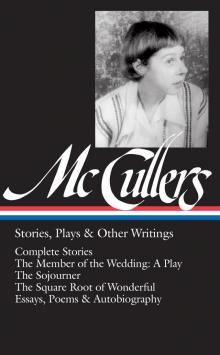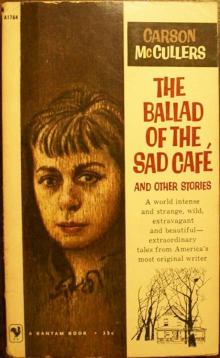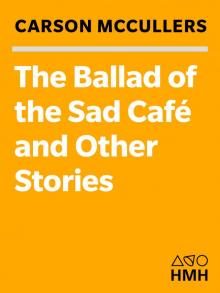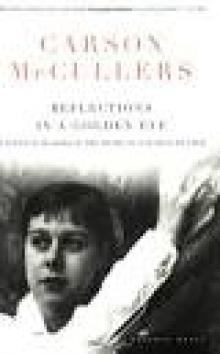- Home
- Carson McCullers
Clock Without Hands Page 2
Clock Without Hands Read online
Page 2
That day Malone had an encounter that upset him strangely, although on the surface it was an ordinary happening. The business section was deserted, but he heard footsteps behind him and when he turned a corner the footsteps still followed. When he took a short cut through an unpaved alley the steps no longer sounded, but he had the uneasy sense of being followed and glimpsed a shadow on the wall. He turned so suddenly that he collided with his follower. He was a colored boy that Malone knew by sight and in his walks he seemed always to run across him. Or perhaps it was simply that he noticed the boy whenever he saw him because of his unnatural appearance. The boy was medium-sized with a muscular body and a face that was sullen in repose. Except for his eyes, he looked like any other colored boy. But his eyes were bluish-gray, and set in the dark face they had a bleak, violent look. Once those eyes were seen, the rest of the body seemed also unusual and out of proportion. The arms were too long, the chest too broad—and the expression alternated from emotional sensitivity to deliberate sullenness. The impression on Malone was such that he did not think of him in harmless terms as a colored boy—his mind automatically used the harsh term bad nigger, although the boy was a stranger to him and as a rule he was lenient in such matters. When Malone turned and they collided, the nigger steadied himself but did not budge, and it was Malone who stepped back a pace. They stood in the narrow alley and stared at each other. The eyes of both were of the same gray-blue and at first it seemed a contest to outstare each other. The eyes that looked at him were cold and blazing in the dark face—then it seemed to Malone that the blaze flickered and steadied to a look of eerie understanding. He felt that those strange eyes knew that he was soon to die. The emotion was so swift and shocking that Malone shuddered and turned away. The stare had not lasted more than a full minute and there was no seeming consequence—but Malone felt that something momentous and terrible had been accomplished. He walked unsteadily the remaining length of the alley and was relieved to find ordinary friendly faces at the end. He was relieved to get out of the alley and enter his safe, ordinary, familiar pharmacy.
The old Judge often stopped by the pharmacy to have a drink before Sunday dinner, and Malone was glad to see that he was there already, holding forth to a group of cronies who stood before the fountain counter. Malone greeted his customers absently but did not linger. The electric fans on the ceiling churned the mixed odors in the place—syrupy smells from the fountain with the bitter medicinal smells from the compounding section in the rear.
"Be with you in a minute, J.T.," the old Judge interrupted himself to say as Malone passed on his way to the back room. He was an enormous man with a red face and a rough halo of yellow-white hair. He wore a rumpled linen white suit, a lavender shirt, and a tie adorned with a pearl stickpin and stained with a coffee spot. His left hand had been damaged by a stroke and he rested it cautiously on the counter edge. This hand was clean and slightly puffy from disuse—while the right one, which he used constantly as he talked, was dingy-nailed, and he wore a star sapphire on the ring finger. He was carrying an ebony cane with a silver crooked handle. The Judge finished his harangue against the Federal Government and joined Malone in the compounding section.
It was a very small room, separated from the rest of the store by a wall of medicine bottles. There was just enough room for a rocking chair and the prescription table. Malone had brought out a bottle of bourbon and unfolded a desk chair from a corner. The Judge crowded the room until he lowered himself carefully into the rocking chair. The smell of sweat from his huge body mingled with the smell of castor oil and disinfectant. The whiskey splashed lightly against the bottom of their glasses when Malone poured.
"Nothing is so musical as the sound of pouring bourbon for the first drink on a Sunday morning. Not Bach or Schubert or any of those masters that my grandson plays..." The Judge sang:
"Oh, whiskey is the life of man ... Oh, whiskey! Oh, Johnny!"
He drank slowly, pausing after each swallow to move his tongue in his mouth and take a little after-swallow. Malone drank so quickly that the liquor seemed to blossom in his belly like a rose.
"J.T., have you ever stopped to consider that the South is in the vortex of a revolution almost as disastrous as the War Between the States?" Malone had not considered, but he turned his head to one side and nodded gravely as the Judge went on: "The wind of revolution is rising to destroy the very foundations on which the South was built. The poll tax will soon be abolished and every ignorant Nigra can vote. Equal rights in education will be the next thing. Imagine a future where delicate little white girls must share their desks with coal-black niggers in order to learn to read and write. A minimum-wage law so outrageously high that it will be the death knell of the rural South may be forced on us. Imagine paying a passel of worthless field hands by the hour. The Federal Housing Projects are already the ruination of the real estate investors. They call it slum clearance—but who makes the slums, I ask you? The people who live in slums make the slums themselves by their own improvidence. And mark my words, those same Federal apartment buildings—modern and Northern as they are—will be turned into a slum in ten years' time."
Malone listened with the trustful attentiveness that he had given the sermon at church. His friendship with the Judge was one of his great prides. He had known the Judge ever since he had come to Milan and had often hunted at his place during the hunting season—he was there the Saturday and Sunday before the death of the Judge's only son. But a special intimacy had flowered after the Judge's illness—when it seemed for a time that the old congressman was finished politically. Malone would visit the Judge on Sundays bringing a mess of turnip greens from his garden or a certain water-ground cornmeal that the Judge liked. Sometimes they would play poker—but usually the Judge would talk and Malone would listen. At these times Malone felt near the center of power—almost as though he too was a congressman. When the Judge was up and around, he came often on Sunday to the pharmacy and they would drink together in the compounding room. If Malone ever had misgivings about the ideas of the old Judge, he smothered them immediately. For who was he to cavil with a congressman? And if the old Judge was not right, who could be right? And now that the old Judge was talking about running for Congress again, Malone felt that the responsibility would be where it ought to be and he was content.
With the second drink the Judge brought out his case of cigars and Malone prepared both of them because of the Judge's handicap. The smoke rose in straight lines to the low ceiling and broke there. The door to the street was open and a slice of sunlight made the smoke clouds opalescent.
"I have a serious request to ask you," Malone said. "I want to draw up my will."
"Always glad to oblige you, J.T. Is there anything particular?"
"Oh, no, just the usual thing—but I want it done as soon as you can get around to it." He added in a flat voice, "The doctors say I don't have too long to live."
The Judge stopped rocking and put down his glass. "Why, what on earth! What's wrong with you, J.T.?"
Malone was speaking of his illness for the first time and the words somehow relieved him. "Seems I have a blood disease."
"A blood disease! Why, that's ridiculous—you have some of the best blood in this state. I well remember your father who had his wholesale pharmacy on the corner of Twelfth and Mulberry in Macon. And your mother I remember, too—she was a Wheelwright. You have the best blood in this state in your veins, J.T., and never forget that."
Malone felt a little chill of pleasure and pride that passed almost immediately. "The doctors—"
"Oh, doctors—with all due respect to the medical profession, I seldom believe a word they say. Never let them intimidate you. Some years ago when I had that little seizure, my doctor—Doc Tatum over at Flowering Branch—began this alarmist talk. No liquor or cigars or even cigarettes. Seemed like I had better learn to pick a harp or shovel coal." The Judge's right hand plucked on imaginary strings and made a shoveling gesture. "But I spoke up to Doc and followed
my own instincts. Instincts, that's the only thing a man can follow. And here I am as hale and hearty as a man my age could wish to be. And poor Doc, the irony—I was a pallbearer at his funeral. The irony was that Doc was a confirmed teetotaler who never smoked—although he occasionally enjoyed a chew. A grand fellow and a glory to the medical profession, but like every man-jack of them, alarmist in judgment and fallible. Don't let them intimidate you, J.T."
Malone was comforted, and as he began another drink he began to consider the possibility that Hayden and the other doctors had made a mistaken diagnosis. "The slide showed it was leukemia. And the blood count showed a terrible increase in leucocytes."
"Leucocytes?" asked the Judge. "What are they?"
"White blood cells."
"Never heard of them."
"But they're there."
The Judge massaged the silver handle of his cane. "If it was your heart or liver or even your kidneys I could understand your alarm. But an insignificant disorder like too many leucocytes does seem a little farfetched to me. Why I've lived for more than eighty years without ever considering if I have any of those leucocytes or not." The Judge's fingers curved with a reflexive movement, and as he straightened them again he looked at Malone with wondering blue eyes. "All the same it's a fact that you look peaked these days. Liver is excellent for the blood. You ought to eat crisp fried calf liver and beef liver smothered in onion sauce. It's both delicious and a natural cure. And sunlight is a blood moderator. I bet there's nothing wrong with you that sensible living and a spell of Milan summer won't cure." The Judge lifted his glass. "And this is the best tonic—stimulates the appetite and relaxes the nerves. J.T., you are just tense and intimidated."
"Judge Clane."
Grown Boy had entered the room and stood there waiting. He was the nephew of Verily, the colored woman who worked for the Judge, and he was a tall fat boy of sixteen who did not have his share of sense. He wore a light blue suit that was too tight for him and pointed tight shoes that made him walk in a gingerly crippled way. He had a cold and, although a handkerchief showed in his breast pocket, he wiped his running nose with the back of his hand.
"It's Sunday," he said.
The Judge reached in his pocket and gave him a coin.
As Grown Boy limped eagerly toward the fountain, he called back in a sweet slow voice, "Much obliged, Judge Clane."
The Judge was looking at Malone with quick sad glances but when the pharmacist turned back to him he avoided his eyes and began to massage his cane again.
"Every hour—each living soul comes closer to death—but how often do we think of it? We sit here having our whiskey and smoking our cigars and with each hour we approach our final end. Grown Boy eats his cone without ever wondering about anything. Here I sit, a ruin of an old man, and death has skirmished with me and the skirmish has ended in a stalemate. I am a stricken field on death's old battleground. For seventeen years since the death of my son, I have waited. Oh, Death, where is thy victory now? The victory was won that Christmas afternoon when my son took his own life."
"I have often thought of him," Malone said. "And grieved for you."
"And why—why did he do it? A son of such beauty and such promise—not yet twenty-five and graduated magna cum laude at the University. He had already taken his law degree and a great career could have been open to him. And with a beautiful young wife and a baby already on the way. He was well-to-do—even rich—that was the zenith of my fortunes. For a graduation present I gave him Sereno for which I had paid forty thousand dollars the year before—almost a thousand acres of the best peach land. He was the son of a rich man, fortune's darling, blessed in all ways, at the threshold of a great career. That boy could have been President—he could have been anything he wanted. Why should he die?"
Malone said cautiously, "Maybe it was a fit of melancholia."
"The night he was born I saw a remarkable falling star. It was a bright night and the star made an arc in the January sky. Miss Missy had been eight hours in labor and I had been groveling before the foot of her bed, praying and crying. Then Doc Tatum collared me and jerked me to the door saying, 'Get out of here you obstreperous old blunderbuss—get drunk in the pantry or go out in the yard.' And when I went out in the yard and looked at the sky, I saw the arc of that falling star and it was just then that Johnny, my son, was born."
"No doubt it was prophetic," Malone said.
"Later on I bustled into the kitchen—it was four o'clock—and fried Doc a brace of quail and cooked grits. I was always a great hand at frying quail." The Judge paused and then said timidly, "J.T., do you know something uncanny?"
Malone watched the sorrow on the Judge's face and did not answer.
"That Christmas we had quail for dinner instead of the usual turkey. Johnny, my son, had gone hunting the Sunday before. Ah, the patterns of life—both big and small."
To comfort the Judge, Malone said: "Maybe it was an accident. Maybe Johnny was cleaning his gun."
"It wasn't his gun. It was my pistol."
"I was hunting at Sereno that Sunday before Christmas. It was probably a fleeting depression."
"Sometimes I think it was—" The Judge stopped, for if he had said another word he might have cried. Malone patted his arm and the Judge, controlling himself, started again. "Sometimes I think it was to spite me."
"Oh, no! Surely not, sit. It was some depression that no one could have seen or controlled."
"Maybe," said the Judge, "but that very day we had been quarreling."
"What about it? Every family quarrels."
"My son was trying to break an axiom."
"Axiom? What kind of axiom?"
"It was about something inconsequential. It was a case about a black man it was my duty to sentence."
"You are just blaming yourself needlessly," Malone said.
"We were sitting at the table with coffee and cigars and French cognac—the ladies were in the parlor—and Johnny got more and more excited and finally he shouted something to me and rushed upstairs. We heard the shot a few minutes later."
"He was always impetuous."
"None of the young people these days seem to consult their elders. My son up and got married after a dance. He woke up his mother and me and said, 'Mirabelle and I are married.' They had eloped to a justice of the peace, mind you. It was a great grief to his mother—although later it was a blessing in disguise."
"Your grandson is the image of his father," Malone said.
"The living image. Have you ever seen two boys so shining?"
"It must be a great comfort to you."
The Judge mouthed his cigar before he answered: "Comfort—anxiety—he is all that is left."
"Is he going to study for the law and enter politics?"
"No!" the Judge said violently. "I don't want the boy in law or politics."
"Jester is a boy who could make his career in anything," Malone said.
"Death," said the old Judge, "is the great treachery. J.T., you feel the doctors believe you have a fatal disease. I don't think so. With all due respect to the medical profession, the doctors don't know what death is—who can know? Even Doc Tatum. I, an old man, have expected death for fifteen years. But death is too cunning. When you watch for it and finally face it, it never comes. It corners around sideways. It slays the unaware as often as it does the ones who watch for it. Oh, what, J.T.? What happened to my radiant son?"
"Fox," Malone asked, "do you believe in the eternal life?"
"I do as far as I can encompass the thought of eternity. I know that my son will always live within me, and my grandson within him and within me. But what is eternity?"
"At church," Malone said, "Dr. Watson preached a sermon on the salvation that draws a bead on death."
"A pretty phrase—I wish I had said it. But no sense at all." He added finally, "No, I don't believe in eternity as far as religion goes. I believe in the things I know and the descendants who come after me. I believe in my forebears, too. Do yo
u call that eternity?"
Malone asked suddenly, "Have you ever seen a blue-eyed Nigra?"
"A Nigra with blue eyes you mean?"
Malone said, "I don't mean the weak-eyed blue of old colored people. I mean the gray-blue of a young colored boy. There's one like that around this town, and today he startled me."
The Judge's eyes were like blue bubbles and he finished his drink before he spoke. "I know the nigger you're thinking of."
"Who is he?"
"He's just a nigger around the town who's of no interest to me. He gives massages and caters—a jack-of-all-trades. Also, he is a well-trained singer."
Malone said, "I ran into him in an alley behind the store and he gave me such a shock."
The Judge said, with an emphasis that seemed at the moment peculiar to Malone, "Sherman Pew, that's the nigger's name, is of no interest to me. However, I'm thinking of taking him on as a houseboy because of the shortage of help."
"I never saw such strange eyes," Malone said.
"A woods colt," the Judge said; "something wrong between the sheets. He was left a foundling in the Holy Ascension Church."
Malone felt that the Judge had left some tale untold but far be it from him to pry into the manifold affairs of so great a man.
"Jester—speaking of the devil—"
John Jester Clane stood in the room with the sunlight from the street behind him. He was a slight limber boy of seventeen with auburn hair and a complexion so fair that the freckles on his upturned nose were like cinnamon sprinkled over cream. The glare brightened his red hair but his face was shadowed and he shielded his wine-brown eyes against the glare. He wore blue jeans and a striped jersey, the sleeves of which were pushed back to his delicate elbows.
"Down, Tige," Jester said. The dog was a brindle boxer, the only one of its kind in town. And she was such a fierce-looking brute that when Malone saw her on the street alone he was afraid of her.
"I soloed, Grandfather," Jester said in a voice that was lifted with excitement. Then, seeing Malone, he added politely, "Hey, Mr. Malone, how are you today?"

 Carson McCullers
Carson McCullers Clock Without Hands
Clock Without Hands The Ballad of the Sad Cafe: And Other Stories
The Ballad of the Sad Cafe: And Other Stories The Member of the Wedding
The Member of the Wedding Collected Stories
Collected Stories The Ballad of the Sad Cafe
The Ballad of the Sad Cafe Reflections in a Golden Eye
Reflections in a Golden Eye The Heart Is a Lonely Hunter
The Heart Is a Lonely Hunter Carson McCullers - Reflections In A Golden Eye
Carson McCullers - Reflections In A Golden Eye Collected Stories of Carson McCullers
Collected Stories of Carson McCullers